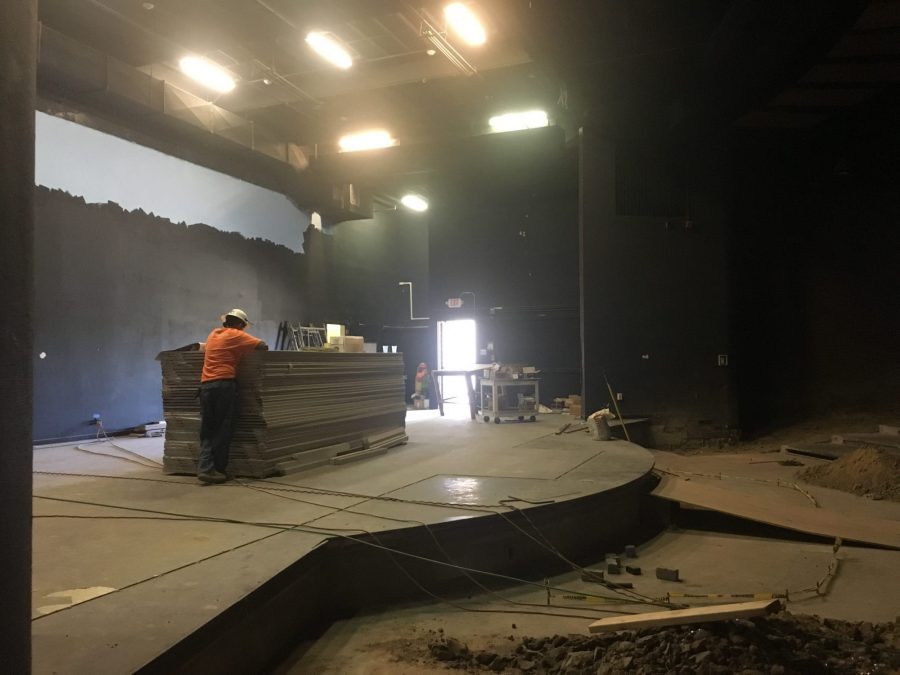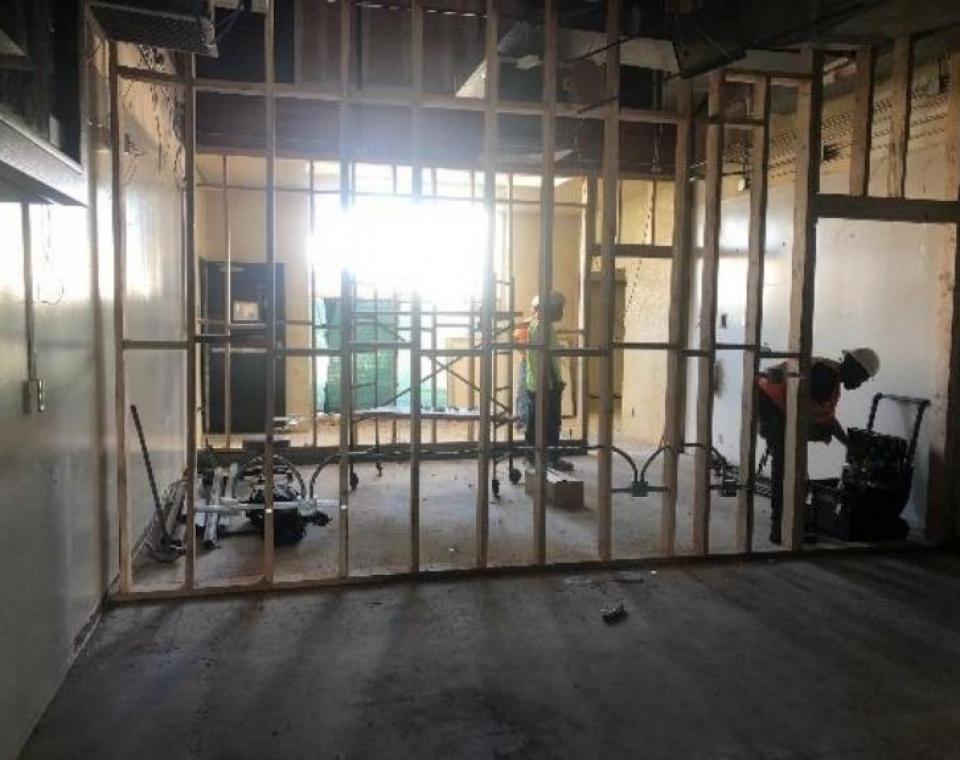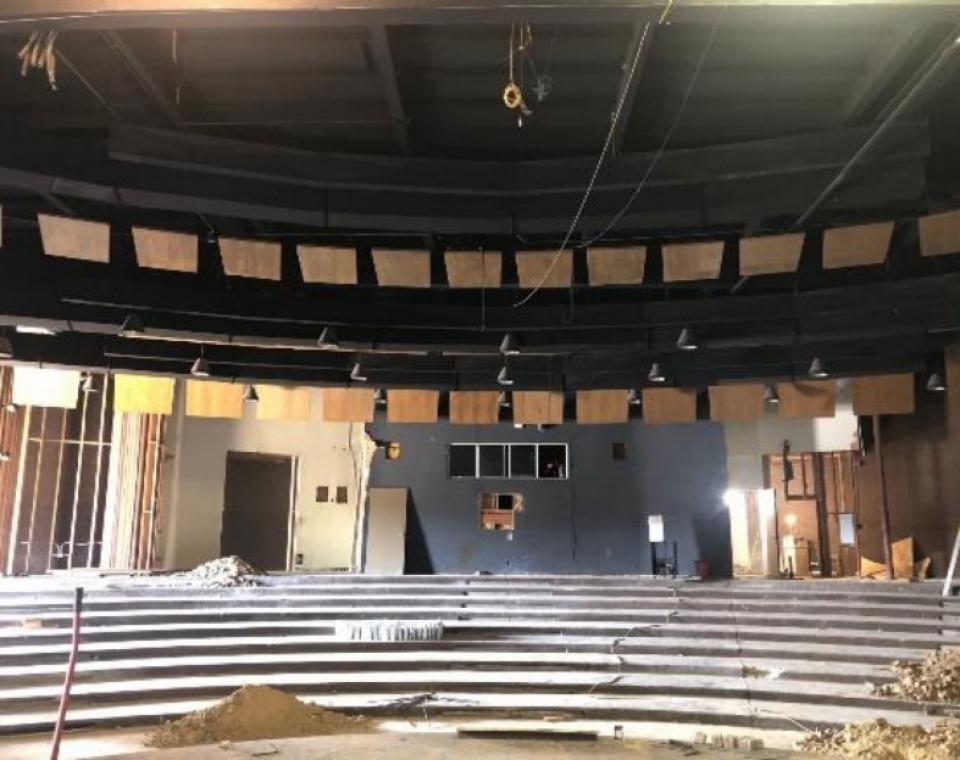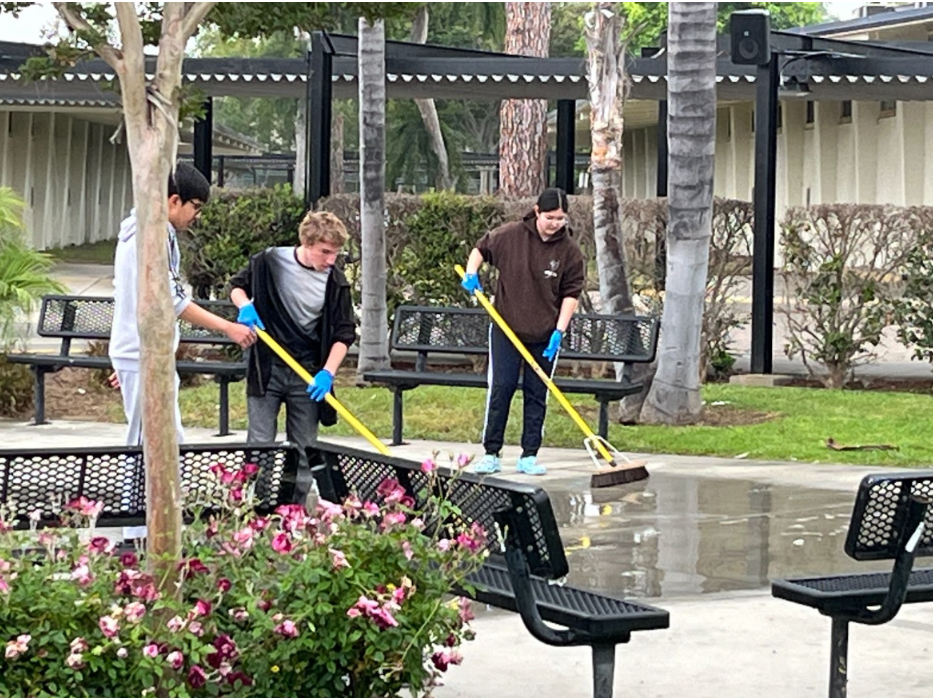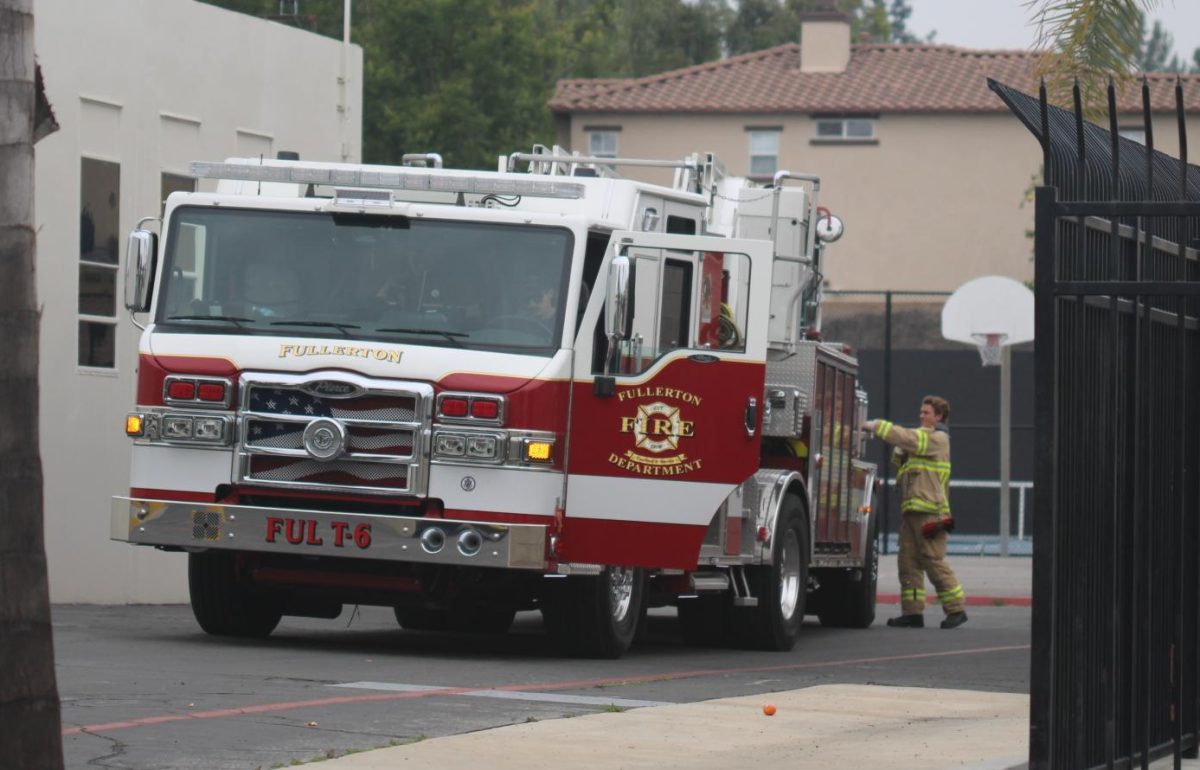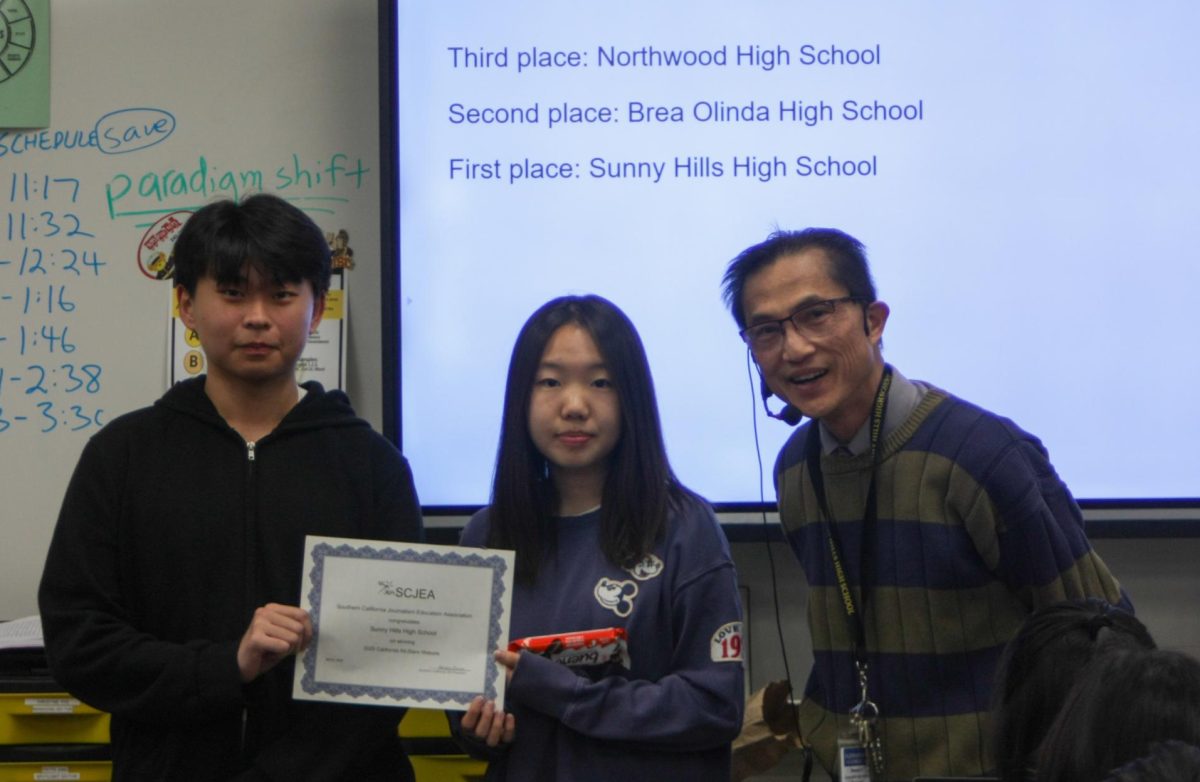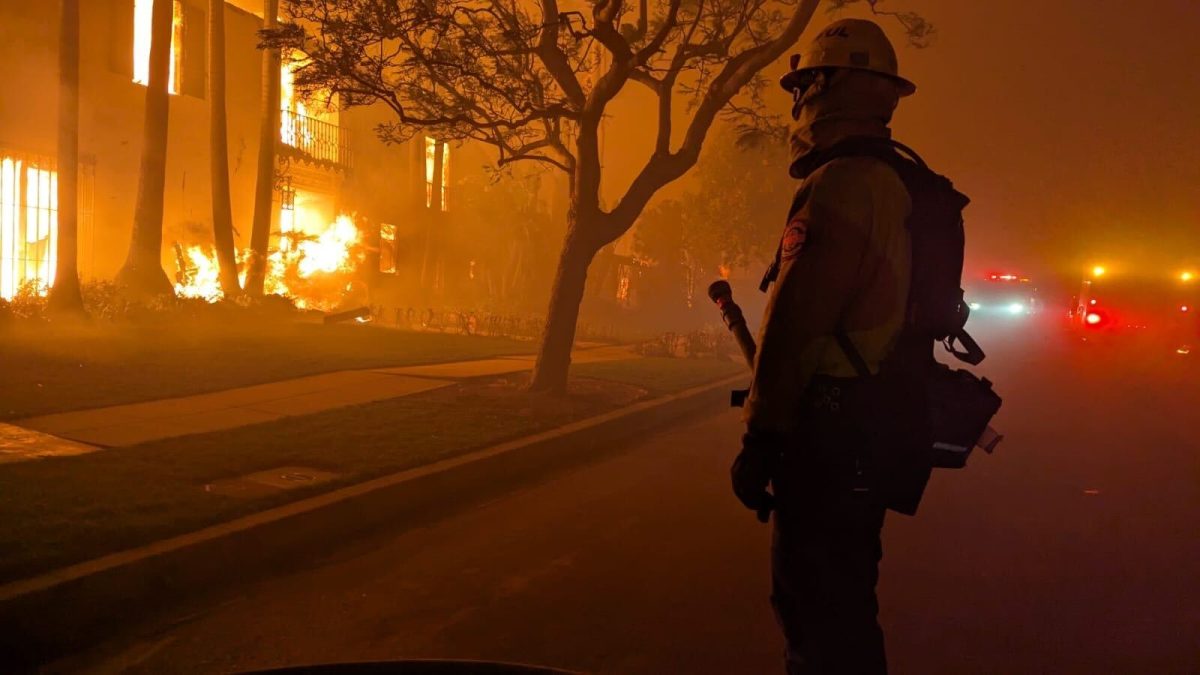While the Performing Arts Center [PAC] remains closed for remodeling until at least February, the programs that use it during the school year have had to adjust to new locations ranging from Buena Park High School’s theater building to the cafeteria.
“Things are always changing, but [it’s] their best estimate, and our district construction guys have been really good on their estimates,” principal Allen Whitten said. “They nailed the pool, [and] they nailed the gym, so if they say February, I pretty much want to believe them.”
The theater department, also known as the Camelot Theatre Co., has had to adjust to its relocation the fastest since its next performance, “Traditions: Bedtime Stories,” is scheduled for Aug. 21-22 from 7 to 9 p.m.
During the school day, theater and English teacher Amanda Gieser said she and her drama students not only have access to her regular class, Room 26, but administrators have opened up the adjoining room, Room 25, as well.
“My [theater classes] have more space [in Room 26],” Gieser said. “They can’t work when there’s desks in [Room 26].”
After school is another matter. For Gieser and her students to rehearse and set up for “Bedtime Stories,” Gieser said they’ve been traveling off campus three miles away by bus to practice and set up tech the week before the shows at Buena Park High School ’s remodeled PAC.
“[Buena Park’s theater program] used our space while they were under renovation, so now, we’re using theirs,” she said. “[My] students have known for a couple of years that we would be performing at [Buena Park High School] once renovations started, and they welcomed and worked with [Buena Park’s] students who were here when their space was being renovated.”
“We’re taking on the mentality that we can only do what we can with what we have, and then we will just be learning to go with the flow this year and be flexible.”
Meanwhile, since 2011, Gieser and her students have been storing costumes, and now some props, behind the PAC in a labeled shipping container. Gieser’s Period 7 Theater Tech class, tasked with creating props for performances, meets in her classroom and also works in Room 132, where the auto tech class meets periods 3-6, said junior Rebecca Back, a Theater Tech student.
Now, knowing when the theater will re-open is exciting, Gieser said.
“That means our seniors will get to perform in the new space, and they’ll get to take their final bow on their home stage instead of someone else’s,” she wrote via email.
Things are not as challenging for the music programs, which have been meeting in the cafeteria during the school day since the PAC closed May 20.
“Being in the cafeteria is the best possible temporary solution while our band room is getting renovated because it has a really high ceiling so it has good acoustics in here,” music teacher Whitney Ting said. “[It’s] just a little bit of a bummer not to be in my regular room, but I’m trying to keep a positive attitude about it because in the long run, it’s worth it to have a really nice room, so I don’t want to be negative.”
Marching band and symphonic band flute player senior Sonia Martin also had pros and cons of playing in the cafeteria.
“The thing about going to the cafeteria for class isn’t all that bad, it’s just that we have no space for anything,” she said. “We’ve been having [marching band] practices since summer and we’ve taken over the school, basically, because some people are on [one] side [of the school], and then people are on the grass area [and] we’re just everywhere because there’s no space.”
The room does have enough surface area to house a portable divider separating the cafeteria lunch line from the music side (the divider is stored away after school), chairs, a grand piano and tables stacked on each other to form instrument shelves.
“All of my classes [have] over 40 people, and marching band has 111 people,” Ting said. “The main challenge is arranging our stuff in here in a very precise, Tetris-ed way to make everything fit.”
The music department received four storage units from the district the last week of the 2018-2019 school year in May, she said, on the volleyball courts beside the field.
“It’s kind of hard if someone needs something and [it’s in one of the units],” Martin said. “That’s literally what Mrs. Ting says, ‘It’s stuck in a box and where we can’t get it.’ ”
For Martin, her flute is small enough to carry with her during school, so storage isn’t much of a problem.
“Because I have a flute, it’s really easy; I [could] just put it in my locker if I wanted to,” she said. “[But] there’s a lot of people who are having a worse time, [for example] a tuba player, since [the tuba] is such a big instrument.”
Because the cafeteria does not have an air conditioning system, Ting said Whitten ordered a rental unit be set up behind the building to push air into its windows with the unit’s yellow, oversized metal ducts.
“[It was] installed in here really quickly …. The last week of summer before school started,” she said. “It’s really nice to have that; it made a humongous difference.”
Junior Alan Sin, a marimba player in marching band, had low expectations for the rental at first, but he said it has worked unexpectedly well.
“[It] barely makes any sound and keeps the whole cafeteria moderately cool,” he said.
“When I first saw those giant yellow tubes, I figured that they’d constantly be making loud buzzing noises that would be a nuisance to every rehearsal, but I’m actually very glad they don’t produce any noticeable noise, which otherwise would’ve impacted our playing.”
Despite initial doubts, the setup is working so far, Ting said.
”The kids have handled it really well, really easily,” she said. “They helped move a lot of stuff over here, so I think they’re pretty adaptable, more so than people might think.”
Meanwhile, the 47-year-old building — known as the Fine Arts Complex in May 1972 when it first opened — remains blocked off with green tarp-covered chicken wire and a “Danger, construction area, keep out” sign.
Surpassing the budget of the previous pool and gym renovations, this project’s budget is $4.5 million because the original building is older and larger than other PACs in the district, Whitten said.
“Because our [theater] is much bigger [and] older than some of the others [projects], and just a huge footprint, it needed a lot,” he said. “[It’s] a pretty serious remodel.”
Inside the PAC as of the first week of school, construction workers have installed beams for new walls and doorways on the extended stage and beside the sound booth. Ting’s bare office had wooden planks spelling out her new doorway and wall.
In the barn, the backstage area, construction workers even scooped out part of the concrete foundation in the bathrooms, which isn’t usually included in remodeling projects, Whitten said.
“Typically, you [only] do the new light, sound, seating — all that cosmetic stuff,” he said. “But they’ve [even] taken down some walls; it’s pretty, pretty substantial.”
But until February arrives, Buena Park High School will host Conservatory of Fine Arts performances that would normally be in the PAC.
Not only have the students successfully adjusted to the new situation, but Whitten expressed his thanks toward the affected teachers.
“[Teachers are] being very flexible and [I’m] really grateful that we have such a wonderful staff,” he said. “So with all of that and a $4.5 million budget, I think when it opens, we’re all going to be pretty blown away.”



